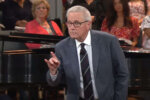High-profile charismatic leaders convened in Orlando in January to discuss the state of the church
A who’s who of prominent charismatic ministers decried what they called an ethical “crisis” in the body of Christ during a first-ever symposium in Orlando, Fla., Jan. 6-7, calling on Christian leaders to deem those who demonstrate persistent ungodly behavior as unrepresentative of true Christianity.
The invitation-only meeting was hosted by Ministries Today magazine, published by Charisma’s parent company, Strang Communications. It drew more than 50 high-profile leaders including Rod Parsley, Joyce Meyer, Rick Joyner and Myles Munroe, and was moderated by Foursquare leader Jack Hayford, pastor of Church on the Way in Van Nuys, Calif.
After discussing issues of moral and financial integrity and the appropriate use of titles, particularly apostle and prophet, participants endorsed a document that has been dubbed the “Orlando Statement.”
“This event was not just significant for the 50 people in attendance, but for the church at large,” said Ministries Today publisher Stephen Strang, who convened the meeting. “It will make a statement about the growing unity in the charismatic-Pentecostal community regarding the need for ethics and a renewed focus on winning the lost.”
An attempt to foster unity and further world evangelism, the Orlando Statement affirmed the “fivefold” ministry gifts listed in Ephesians 4, with the panel noting that the titles apostle and prophet should be used by those who demonstrate “the character and gifting requisite those titles.” The document noted that the use of those titles must “be submitted to the demands of servanthood and not become a distraction … to the very offices that they claim to serve.”
The group also acknowledged an ethical crisis in the church that is marked by a greater tolerance for sexual infidelity, an increase in divorce “under the guise of commitment to ministry callings,” an “indulgent understanding” of the concept of restoration, and a lack of self-moderation in areas of financial responsibility and extravagance.
The crisis was attributed to an increase in the number of ministries that operate outside existing accountability structures, as well as a failure by existing accountability structures to enforce their legal standards because of a lack of peer relationships.
During the two-day event, the group also attributed the moral breakdown to an increased prevalence in ministry being seen as a profession “in which the importance of success and power outweigh the demands of servanthood and integrity.”
The participants urged Christian leaders to asser-tively accept responsibility to minister discipline with love and grace, and to identify behavior that is “adverse to godly values” as “alien to the lifestyle of charismatic Christians and unrepresentative of the true charismatic Christian community.”
“I am certain that the symposium was the beginning of an opportunity that could have a lasting effect on bringing greater understanding and credibility to the charismatic movement from its leaders to the broader body of Christ,” said Parsley, pastor of World Harvest Church in Columbus, Ohio.
Hayford, who serves as Ministries Today’s senior editorial adviser, moderated three panel discussions. The first consisted of Meyer, Parsley, evangelist Reinhard Bonnke, Christian International Ministries founder Bill Hamon, theologian C. Peter Wagner and North Carolina pastor Kingsley Fletcher.
Wagner issued a strong challenge for the church to recognize the ministry of apostles. Although none of the panelists questioned the legitimacy of the fivefold gifts, some expressed concern that the power vested in the titles apostle and prophet often motivates the holder to exercise authority rather than to serve.
“All the fivefold should shepherd the church of God,” said author John Bevere, who issued a forceful call for accountability in prophetic ministry in his 1999 book Thus Saith the Lord? “If we’re not careful, we’re going to get right into what the Pharisees did–more interested in serving themselves than in serving people,” Bevere said.
Bonnke, founder of Christ for All Nations, said the use of titles is a “side issue,” and he called the church to focus on its primary task: winning souls. “It’s not a matter of position but a matter of function,” Bonnke said. “If we concentrate on functions, we will see the fivefold ministries in all their excellence.”
The second panel–comprised of Bevere, Joyner, Generals of Intercession head Cindy Jacobs, Detroit pastor Keith Butler, seminarian Mark Rutland and evangelist Steve Hill–explored ethical and moral issues. Expressing his concern at the onset of the discussion, Hayford said: “Like the book of Judges, the Pentecostal-charismatic movement is increasingly moving toward everyone doing what is right in their own eyes. We’re watching the dumbing down of a movement, in many ways–dumbing down in the thoughtful pursuit of what we’re really about.”
Hayford added that many people embrace charismatic tenets but are hesitant to identify with the movement because of concerns about high-profile leaders who flaunt excess and demonstrate shoddy ethics.
“We don’t have good character because we think we’re so important,” said Jacobs, who added that the larger a ministry becomes, the more layers of accountability it needs.
Joyner, founder of Morningstar Ministries, was more blunt: “In anything, our main commodity is truth, integrity, reality. Shame on us for what we’ve allowed the church to become on our watch.”
The third and final panel–consisting of Munroe, National Association of Evangelicals (NAE) head Ted Haggard, Bible teacher R.T. Kendall, Charisma editor J. Lee Grady, pastor and author Francis Frangipane, and pastor Frank Reid of Bethel AME Church in Baltimore–explored the Pentecostal-charismatic movement’s future.
Haggard suggested that the distinction between the Pentecostal-charismatic community and the evangelical world was quickly becoming irrelevant. In his work with the NAE, he said he has “found no resistance to the Pentecostal-charismatic message, and within 10 years, I don’t know if there will be a distinction. I don’t think the issue is theological; the issue is style.”
Munroe, pastor of Bahamas Faith Ministries International, expressed concern that many in the movement had not offered a public statement on the issues of homosexuality, gay marriage and the doctrine of universal reconciliation. “My heart is that we will take generational responsibility in this room before we leave,” he said. “I don’t want to be famous or important, but I want to be faithful to this generation.”
The Orlando Statement was published in the March/April issue of Ministries Today and posted on its Web site. Readers can log on to www.ministriestoday.com to read the entire document.
Matt Green






Leave a Comment
You must be logged in to post a comment.